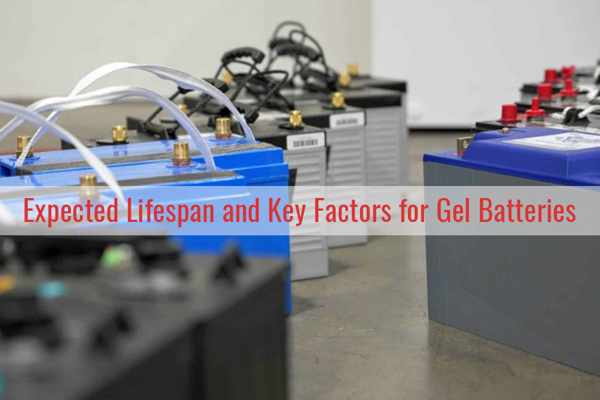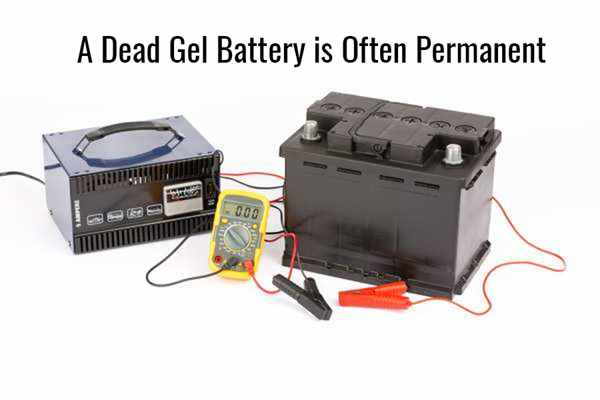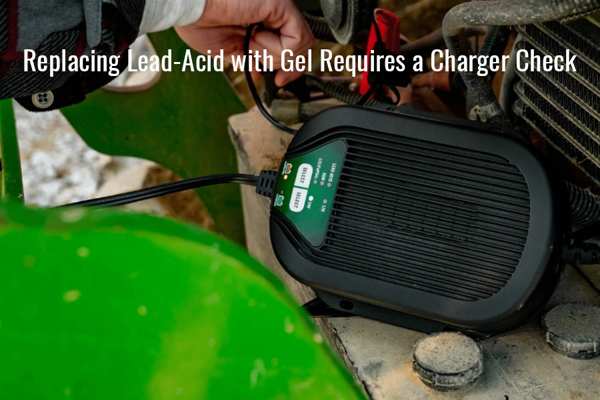Is a gel battery better than lead-acid?
When selecting a battery for a solar system, RV, or backup power application, you’ll often face a choice within the lead-acid family: Is a modern "gel battery" a better option than a standard "lead-acid battery"? To make the best choice, we first need to clarify that a gel battery is a specific type of lead-acid battery. The real question is how it compares to the traditional "flooded" type.
A gel battery is a type of sealed, maintenance-free lead-acid battery (VRLA). It is generally "better" if your top priorities are convenience and safety, as it requires no maintenance and is spill-proof. A traditional flooded lead-acid (FLA) battery is "better" if your primary goal is the lowest possible upfront cost and you are prepared to perform regular upkeep. The best choice truly depends on your specific needs and priorities.

At Gycx Solar, we supply a range of battery technologies because we understand that the "best" solution is different for every project. Our expertise lies in helping you understand the trade-offs. Let’s explore some of the most common questions about gel batteries.
What are the disadvantages of a gel battery?
The "set it and forget it" convenience of gel batteries is very attractive, but it’s important to understand their potential drawbacks. Knowing the limitations helps ensure that a gel battery is the right long-term choice for your specific application and environment.
The main disadvantages of a gel battery are its higher initial cost compared to flooded lead-acid batteries and its significant sensitivity to improper charging. Overcharging a gel battery can cause permanent, irreversible damage. They also typically have slower charge acceptance rates and are more sensitive to high temperatures, which can shorten their lifespan, especially in a consistently warm climate like Singapore’s.

Dive Deeper: A Realistic Look at Gel Battery Limitations
Let’s break down these potential cons:
- Higher Upfront Cost: Gel technology is more advanced and complex to manufacture than traditional flooded cells. This premium is for the convenience of the sealed, maintenance-free design.
- Charging Sensitivity: This is the most critical point. Gel batteries require a very specific, lower-voltage charging profile. Using a charger designed for flooded batteries, which often has higher voltage settings and an aggressive "equalization" phase, will destroy a gel battery by drying out its electrolyte. A compatible, smart charger is not optional—it’s essential.
- Slower Charging: Gel batteries generally have higher internal resistance than other types like AGM or flooded batteries. This means they can’t accept charge as quickly. In a solar application, this could mean less energy is captured on days with intermittent sun.
- Heat Sensitivity: All lead-acid batteries degrade faster in high temperatures, and the ideal operating temperature is around 25°C (77°F). In a perennially hot and humid climate like Singapore’s, a battery kept in a poorly ventilated space can see its lifespan cut dramatically. The heat can also exacerbate the effects of even minor overcharging.
- Irreversible Damage: The sealed design that provides convenience also means that damage is usually permanent. If the gel electrolyte is dried out from overcharging or if the battery is deeply sulfated from being left in a discharged state, it cannot be revived.
What is the lifespan of a gel battery?
When you invest in gel batteries, you need a realistic expectation of their service life. How many years of reliable performance can you count on? With proper care and the right conditions, they can be quite durable workhorses.
A high-quality deep-cycle gel battery, when charged correctly and kept in a moderate temperature environment, can typically have a calendar life of between 5 to 10 years. In terms of usage, it can deliver anywhere from 500 to over 1,000 charge-discharge cycles. It’s crucial to understand that this lifespan is highly dependent on how the battery is treated, especially regarding charging, temperature, and how deeply it is discharged.

Dive Deeper: Maximizing Your Gel Battery’s Lifespan
The actual service life you get from your gel battery is determined by several key factors:
- Depth of Discharge (DoD): This refers to how much of the battery’s capacity you use in each cycle. A battery that is only discharged to 30% of its capacity will last for many more cycles than one that is consistently discharged to 80%. Sizing your battery bank so you don’t have to drain it deeply every day is a key strategy for longevity.
- Charging Method: As we’ve stressed, using the correct gel-specific charging profile from a compatible smart charger or solar charge controller is the most important factor in achieving a long life.
- Operating Temperature: Heat is the number one enemy of lead-acid battery longevity. A battery operating in a 35°C environment may only last half as long as the same battery kept at 25°C. In a climate like Singapore’s, installing batteries in the coolest and most well-ventilated location possible is essential.
- Manufacturing Quality: Reputable manufacturers use higher-purity materials and more robust construction, which leads to better performance and a longer service life.
- How It Compares to Other Technologies:
- vs. Flooded Lead-Acid (FLA): A well-cared-for gel battery will typically outlast a neglected FLA battery. However, a premium, meticulously maintained industrial FLA battery might offer a similar lifespan.
- vs. Lithium (LFP1. ): This is where the difference is starkest. A modern LFP battery, which Gycx Solar often recommends for solar, offers a much longer life (10-20 years and 3,000-6,000+ cycles), making it a superior long-term investment in most cases.
How to revive a gel battery?
Your gel battery seems completely unresponsive or "dead." Is there a secret handshake or a special trick to bring it back to life? This is a common question, born from stories of reconditioning old car batteries.
Unfortunately, for a sealed gel battery, the answer is generally no. If a gel battery is truly "dead" because it has been physically damaged by overcharging (where the gel has dried out) or chemically damaged by severe sulfation (from being left discharged for a long time), it is very difficult or impossible to revive. Unlike flooded batteries, its sealed design prevents the addition of water or the aggressive reconditioning charges that might otherwise help.

Dive Deeper: Why Prevention is the Only Cure
Here’s why reviving a "dead" gel battery is usually a futile effort:
- Permanent Damage from Overcharging: When a gel battery is overcharged, the water in the electrolyte is broken down and vented as gas. This process is irreversible. The gel dries, shrinks, and hardens, pulling away from the battery’s lead plates. This creates voids, and that part of the battery can no longer store energy. No amount of charging can fix this physical damage.
- Severe Sulfation: If any lead-acid battery is left in a discharged state, hard lead sulfate crystals form on the plates, choking its ability to accept a charge. On a flooded battery, a controlled high-voltage "equalization" charge can sometimes break up these crystals. However, attempting this on a gel battery would cause the destructive drying-out process described above. While some very sophisticated, multi-stage chargers have low-current "recovery" modes, their effectiveness on a deeply sulfated sealed gel battery is extremely limited.
- The Best Strategy: Prevention: The only reliable way to deal with a dead gel battery is to prevent it from dying in the first place. This means:
- Using the correct, compatible charger with a "GEL" profile from day one.
- Never leaving the battery in a deeply discharged state. Recharge it promptly after use.
- Keeping the battery in a cool environment.
Gycx Solar Story: "A customer once brought us a completely dead gel battery from their boat, asking if we could ‘zap’ it back to life. After testing it, we saw the internal resistance was sky-high, a classic sign of irreversible damage from sulfation or overcharging. We had to explain that prevention, through a modern solar charge controller like the ones we install, would have saved their investment."
Can you replace a lead-acid battery with a gel battery?
You currently have a traditional flooded lead-acid (FLA) battery system and are tired of the regular maintenance. You’re thinking of upgrading to the convenience of a sealed gel battery. Is it a simple "drop-in" replacement?
Yes, you can often replace a flooded lead-acid battery with a gel battery of a similar physical size and voltage, but with one critical condition: you MUST ensure your charging system (e.g., your vehicle’s alternator regulator, your boat’s battery charger, or your solar charge controller) is compatible with or can be set to a specific "GEL" charging profile. Simply swapping the battery without updating the charger will likely destroy your new, more expensive gel battery in a short amount of time.

Dive Deeper: The Crucial Compatibility Check
If you’re considering this upgrade, here’s your checklist:
- Physical and Electrical Match:
- Dimensions: Ensure the new gel battery will physically fit in the same space.
- Voltage: The nominal voltage must be the same (e.g., replace a 12V FLA with a 12V gel).
- Capacity (Ah): Choose a similar or higher amp-hour rating based on your needs.
- The Charger Compatibility Audit (Most Important Step):
- Examine Your Existing Charger: Look at your existing battery charger or solar charge controller. Is it a modern "smart" charger with selectable battery types?
- Look for the "GEL" Setting: If it has settings for "Flooded," "AGM," and "GEL," you are in luck! You can swap the battery and simply change the setting on your controller to "GEL."
- If There’s No Setting: If your charger is an older, basic model designed only for flooded batteries, it is not compatible. Its charging voltage will be too high and will damage your new gel battery. In this case, you must replace the charger at the same time you replace the battery.
This is a perfect example of where professional expertise is invaluable. At Gycx Solar, when a customer wants to upgrade or replace their batteries, we conduct a full system audit. We don’t just look at the battery; we assess the compatibility of the charging system to ensure that any new component will perform optimally and safely, protecting your investment for years to come.
So, is a gel battery better? It’s a trade-off between the upfront cost and hassle of a flooded lead-acid battery versus the maintenance-free convenience and higher price of a gel battery. To get the most out of a gel battery’s potential long life, using the correct, compatible charger is absolutely non-negotiable.
Whether you’re sticking with lead-acid technology or are ready to explore the superior lifespan and performance of modern lithium batteries, our team at Gycx Solar can help you navigate the choices. We provide expert advice and high-quality products to ensure you get the best possible energy solution. Contact us today!
Understanding the concept of LFP will help you better compare and understand battery-related data concepts. This will help you select the product that best suits your needs from our company. ↩
